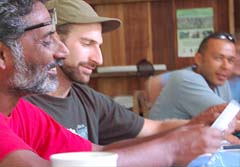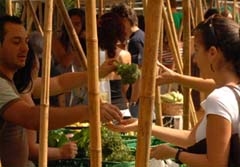Participatory Guarantee System (PGS)
Vor einiger Zeit fand unter dem kühlenden Schatten der Baumkronen in Milo´s Analog Forestry-Finca ein lehrreicher Workshop über ein interessantes, recht neues Labelling-System statt. Das International Analog Forestry Network war Gastgeber. Sogenannte Partizipative Garantiesysteme (PGS) bieten als alternative Zertifizierungssysteme eine Möglichkeit der Bio-Zertifizierung, die ohne die teure Zertifizierung durch Drittparteien auskommt. Tausende von Biobauern auf der ganzen Welt werden heute bereits durch PGS Initiativen zertifiziert.
Inspiriert durch Pioniere der Biobewegung garantiert PGS nicht nur die Glaubhaftigkeit von Bioprodukten, sondern weist auch eine enge Verbindung zu lokalen und alternativen Marktstrategien auf. Im Workshop unter dem Dach des International Analog Forestry Network kamen zahlreiche interessierte Teilnehmer aus ganz unterschiedlichen Teilen der Welt zusammen, um mehr über die Anwendung dieses alternativen Systems zu erfahren und dessen Vermittlung und Anwendung in lokalen Gruppen landwirtschaftlicher Produzenten in ihren Heimatländern zu üben. Vertretene Länder waren unter anderem Brasilien, Peru, Canada, Indien und Costa Rica.
Recently, the International Analog Forestry Network met with interested members of organizations from all over the world to talk about a new labeling scheme for organic small-scale farmers: the Participatory Guarantee System. In the pleasurable atmosphere of Milo´s open air-conference room under the cooling canopy of his tropical analog forest we discussed and brainstormed about the realization and appliance of PGS in different countries.
The Participatory Guarantee System, brought forward by the organic movement, is a labeling scheme for organic certification of its member´s farms and farm products, especially adapted to local markets and short supply chains. It provides an alternative certification system to the third party certification that has become the dominant form of certification in the food sector. PGS is fairly new, however is becoming widely used as an alternative to third-party certification in Brazil, USA and New Zealand. Currently, PGS networks are being established in India.
The system enables organic farmers to obtain certification without having to take on the burden of expensive third party audits. This way, they are able to regain control over the certification process, which is carried out by those who know best what is important in organic farming and what sustainable cultivation looks like – the organic farmers themselves. Too often a cursory, superficial, incompetent and corrupt proceeding of third party certification systems has been observed in the usual process of certification.
PGS provides a simple method based on documents that are easy to understand and in the language of each farmer respectively. For illiterate farm inspectors, PGS offers the option of conducting the inspection on video and answer questions orally. Simple procedures based on documents that are easy to understand make it simple for every participant to conduct farm visits and use their day-to-day knowledge of the farm and the concerned area.
The system involves small and marginal farmers that are usually out of the certification process, in spite of being the most important part of food production. In place of an unconquerable amount of paperwork and huge fees for services from certifiers mostly without any farming experiences, PGS is based on the personal trust and knowledge of the people closest to the land. While farmers are the central pillar of any PGS network, organizing roles are often played by village level organizations, farmer associations, self-help groups, NGOs, and others.
Within their local group of farmers, containing at least five members, participants pledge that they will follow organic standards, improve soil quality, the environment and their own family and community. Thus, they assure they will not use synthetic pesticides, chemical fertilizers and genetically modified seeds rather build a living soil using natural farming practices that respect the local ecology and biodiversity. Further farmers declare themselves responsible for the well-being of their livestock, protection of their organic products from any contamination and participation in regular meetings to share knowledge of standards and organic production techniques. All of these benefits come from farmers taking on a larger role in the world of organic agriculture.
One of the participants in the workshop, who is highly interested in applying this system to one of Costa Rica´s bigger projects within the green movement, is Faviana Scorza, who presented the team of the “Feria Verde de Aranjuez” in Londres. The “Feria Verde” is a weekly market taking place in the green suburbs of Costa Rica´s capital, featuring artisan products, organic, local and healthy foods direct from the producer. With the help of the Participatory Guarantee System the producers of Feria Verde could receive an organic certification of their farms and farm produce without having to take on the unnecessary burden of expensive third party audits. Thus, their delicious products would not only convince in their unmistakably taste and GMO- and pesticide-free healthiness but also with a certification that is recognized by IFOAM (International Federation of Organic Agriculture Movements), the worldwide umbrella organization for the organic movement and the FAO (Food and Agriculture Organisation of the United Nations).


 13-07-15 21:29:00,
13-07-15 21:29:00,
Neueste Kommentare